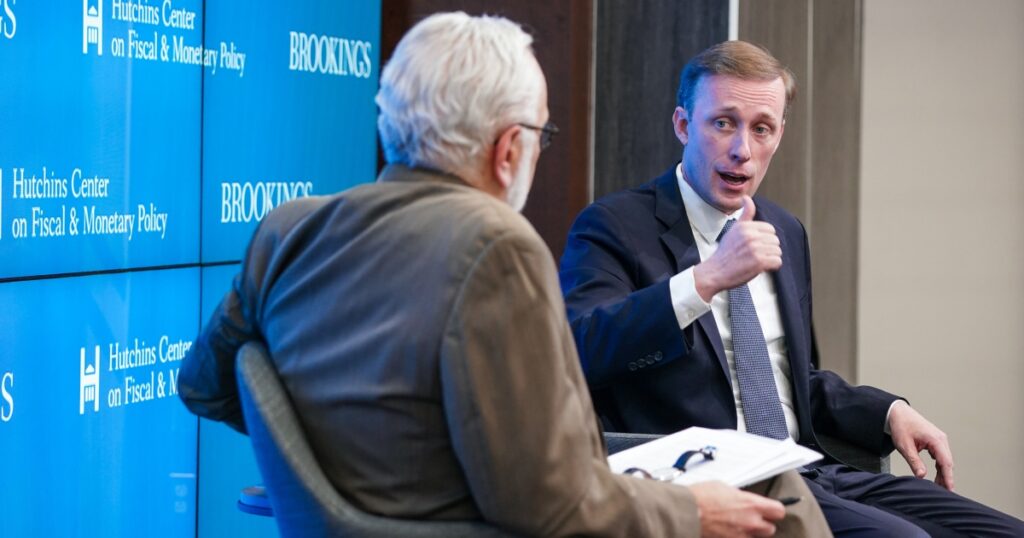Nationwide Safety Advisor Jake Sullivan outlined the Biden administration’s worldwide financial coverage on the Hutchins Heart on Fiscal and Financial Coverage at Brookings on April 27. For video and a transcript of the speech and the Q&A that adopted, click on right here. Beneath are reactions we solicited from observers with totally different viewpoints together with former Treasury Secretary Lawrence Summers, Oren Cass of American Compass, Todd Tucker of the Roosevelt Institute, Bob Davis (previously) of The Wall Road Journal, and students from Brookings and different Washington suppose tanks.
Not a simple promote, however creativeEmily Benson, Director, Undertaking on Commerce & Know-how and Scholl Chair in Worldwide Enterprise, Heart for Strategic & Worldwide Research
Jake Sullivan’s speech at Brookings was comparatively gentle on information however heavy on philosophy, arguing that capitalism must look essentially totally different to be able to confront right now’s issues. Sullivan argued, for instance, that the normal strategy to commerce was primarily based on a set of “oversimplified assumptions.” For instance this level, Sullivan likened the transition to this new world imaginative and prescient as shifting from a Parthenon strategy of the post-WWII period—a system characterised by neat columns and clear strains—to a future replete with Frank Gehry-style structure, evoking Gehry’s overlapping ribbons of metal and aluminum that adorn buildings worldwide. In an apt coincidence, Gehry’s new museum, which is about to open in 2025 in Abu Dhabi, is designed across the theme of “deliberately ‘messy’ transferring into readability.” This “deliberately messy” financial order is unfolding now, as indicated by the pursuit of mini-sectoral preparations just like the World Association on Sustainable Metal and Aluminum with the European Union or a collection of crucial minerals offers with companions akin to Japan. This new financial order displays a messier—however most likely extra correct model—of how the world actually works.
The message is to belief the People, and the remainder will come.
The speech referred to as for persistence and confidence in constructing a worldwide imaginative and prescient, which Sullivan mentioned would require “devoted dedication” amongst allied economies. Sullivan was beneficiant together with his assist of the European Union (EU), clearly aligning itself with EU President von der Leyen’s bid to de-risk slightly than decouple. This direct assist for the European Union is a not-so-subtle nudge for the bloc to proceed inching nearer to the U.S. financial and safety strategy towards China. Whether or not and when EU member states hear the message—and whether or not they’ll commit to creating this new financial order a actuality—stays to be seen. Different third international locations, akin to India, which holds this 12 months’s G20 presidency, and subsequent 12 months’s host, Brazil, can even want to purchase into a brand new period targeted on decarbonization and de-risking. Acquainted questions, akin to tips on how to outline inexperienced commerce or what constitutes a nationwide safety threat, will proceed to floor in outstanding methods.
The message is to belief the People, and the remainder will come. After a long time of overseas coverage missteps and rising pressure with China that leaves most international locations awkwardly within the center, it’s not clear that can be a simple promote. This additionally depends on a elementary assumption that the administration has enough time to “end the job,” which can or is probably not the case. Both means, we should always recognize the forward-looking creativity of the administration and acknowledge their try and do what few have dared: to rethink capitalism for the twenty first century.
Again to high >>

De-risking is inadequate—Decoupling is essentialOren Cass, Government Director, American Compass
Jake Sullivan opened his remarks with a complicated critique of “oversimplified market effectivity,” an unusual and welcome focus for a nationwide safety advisor. Within the home context, that considering by Sullivan and his White Home colleagues has led to beneficial progress on points like antitrust and industrial coverage. So, it’s disappointing that the Biden administration nonetheless refuses to use its evaluation correctly to the problem of America’s financial relationship with China, as a substitute trusting that market forces will generate constructive outcomes. Sullivan characterised the China problem when it comes to nationwide safety, calling for a “small yard, excessive fence” strategy to financial restrictions. As a result of limiting navy tech switch and guaranteeing resilient provide chains are the problem, “we’re for de-risking and diversifying, not decoupling.”
However even when China was to disarm tomorrow, credibly foreswearing any aspirations past its borders, its affect as an financial actor would stay deeply corrosive to American liberty and prosperity. Decoupling is important. Our nation’s free enterprise system is incompatible with one dominated by state-owned, -controlled, and -subsidized opponents. Asking American companies and employees to compete with their Chinese language counterparts grants Chinese language policymakers the facility to form American capital allocations and labor-market circumstances from the far facet of the Pacific. Likewise, our political system is incompatible with an authoritarian one. If our companies are tasked with maximizing their income, and the best revenue might be had by kowtowing to the Chinese language Communist Get together (CCP), that’s what our enterprise leaders will do. Michael Bloomberg will apologize for Boris Johnson’s criticism of China at his convention (and guarantee subsequent 12 months’s convention is extra CCP-friendly).
Nobody thought-about severely an integration of the American and Soviet financial methods. We solely countenanced a coupling with China as a result of we assumed wrongly that it might result in financial and political liberalization. Some are nonetheless dreaming. In her speech at Johns Hopkins final week, Treasury Secretary Janet Yellen imagined “a rising China that performs by the principles” and fosters “rising demand for U.S. services and extra dynamic U.S. industries.” That world sounds pretty, however our worldwide financial technique ought to replicate the one we inhabit.
Again to high >>

Stress between rhetoric and practiceMartin Chorzempa, senior fellow, Peterson Institute for Worldwide Economics
As nationwide safety issues exert elevated affect on financial exercise, readability on the financial views of key nationwide safety policymakers like Jake Sullivan is welcome. His speech was wide-ranging, however two areas the place rhetoric and observe are in pressure may use extra rationalization: how the administration plans to have interaction with allies and the trade-offs the place safety and economics intertwine.
First, Sullivan’s welcome imaginative and prescient for a “robust, resilient, and modern techno-industrial base” shared between the U.S. and companions is far more life like than making every part at dwelling, however the speech is not going to change widespread notion that bringing as a lot exercise as attainable to america—usually to the consternation of U.S. allies, as with the Inflation Discount Act—is the first aim. The emphasis on resilience is comprehensible with COVID provide disruptions and bottlenecks in latest reminiscence, however a single-minded concentrate on resilience to the detriment of effectivity might be simply as dangerous as the other, particularly if inflation is to be tamed. U.S. allies have proven continued dedication to the type of commerce agreements the speech rejects—targeted on decreasing obstacles to commerce between one another, far past tariff reductions. To that finish, I hope the administration can articulate one thing lacking from the speech, an agenda that explores eradicating obstacles to flows of capital, items, and know-how not less than amongst safety allies. Offering advantages like enhanced market entry and streamlined safety critiques or export controls may assist the administration guarantee allies can prosper higher collectively, not simply share the burden of sacrifices from forgoing gross sales in China’s market.
Second, he underscored that restrictions to commerce and funding can be narrowly focused to militarily-relevant areas, a “small yard, excessive fence” idea slightly than a “blockade” towards China. There may be thus little daylight between his speech and Treasury Secretary Yellen’s imaginative and prescient for coverage with China. How small the yard is already, nevertheless, is within the eye of the beholder, and it may develop fairly massive sooner or later. Although the administration has tried to rigorously goal controls, know-how areas Sullivan cited in a speech final 12 months as requiring “as massive of a lead as attainable” embrace many essential for the way forward for industrial know-how. Of these, superior semiconductors have been focused for controls a month later, which hit chips not only for navy purposes however for information facilities, autonomous automobiles, and plenty of synthetic intelligence makes use of. A part of the administration’s imaginative and prescient may illuminate the way it weighs trade-offs in nationwide safety restrictions that come at an financial value—understanding that such prices can create safety vulnerabilities in the long term. For instance, if export controls right now deprive U.S. companies of sufficient income or fears of future controls cause them to be “designed out” of provide chains, they could not have the sources to remain on the leading edge, eradicating the U.S. capability to place controls on superior know-how for nationwide safety and harming the techno-industrial base.
Again to high >>

Motion, not simply phrases, wanted to de-escalate with ChinaBob Davis, former Wall Road Journal reporter, co-author of Superpower Showdown, a historical past of U.S.-China commerce and financial battles.
Jake Sullivan had a number of audiences in thoughts for his remarks.
The message to Congress: The administration is pushing forward with industrial coverage. Don’t anticipate any cuts to the China tariffs. (“In right now’s world, commerce coverage must be about greater than tariff discount,” he mentioned.)
To allies: We wish you to take a position, too, although we wish to be primary. Type of like NATO. (“Burden-sharing in terms of taking some financial hit to guard your nationwide safety is more durable to quantify after which more durable to implement.”)
And to China: We’re open for enterprise. We wish to commerce with you. We don’t wish to maintain you down. Actually.
The final is the hardest message for Sullivan to ship believably. At its core the administration’s China coverage is a) construct up the U.S., b) work with allies, and c) hobble China. The hobbling half is clearest within the administration’s expansive export controls which attempt to block China from getting superior semiconductors and semiconductor manufacturing tools.
It’s going to take greater than phrases and even conferences with the Chinese language to proper U.S.-China relations.
As Sullivan mentioned in September: “Given the foundational nature of sure applied sciences, we should preserve as massive of a lead as attainable.” At Brookings he mentioned the Chinese language had misinterpreted the U.S. strategy as a “know-how blockade.” He’s proper about Chinese language hyperbole, however the breadth of the administration’s ambitions in restraining China’s tech sector is astonishing—far more than the Trump workforce tried.
Now the administration is fearful that its powerful message is barely including to the downward spiral in relations. Relatively than discuss “de-coupling,” Sullivan used the extra diplomatic time period of “de-risking,” favored by the Europeans. And the controls? “We’re merely guaranteeing that U.S. and allied know-how is just not used towards us. We aren’t chopping off commerce.”
However it can take greater than phrases and even conferences with the Chinese language to proper U.S.-China relations. To be believed, the U.S. ought to take some concrete motion to deescalate. An excellent begin could be by ending threats to ban TikTok and determining methods to restrict the hurt from all social media. Let’s see if Beijing reciprocates. Even when it doesn’t, that’s the correct coverage for the U.S. because it confronts China.
Again to high >>

“Purchase American” is a mistakeDavid Greenback, Senior Fellow, John L. Thornton China Heart, Brookings Establishment
There are a number of issues I like in regards to the technique Sullivan laid out: the popularity that financial energy is the muse of nationwide safety and that world points akin to local weather change have to be addressed to be able to create a basis for world peace and prosperity.
What worries me is the heavy concentrate on industrial coverage measures that contain each subsidies and safety of the home market via “Purchase American” provisions. Subsidies are effectively justified for points with massive externalities, however for my part the protectionism will show to be a mistake. Additionally, the administration is utilizing one instrument, industrial coverage, to hit two targets: shield nationwide safety and produce again manufacturing jobs. By attempting to hit two targets, each is to some extent undermined. For nationwide safety: the Purchase American provisions upset our allies and undermine the alliance of superior democratic states. Additionally they make the vitality transition dearer and therefore slower. Limiting the subsidies for electrical automobiles to ones with a specific amount of American content material inevitably makes EVs dearer and slows their adoption.
In regards to the second goal, producing manufacturing jobs within the U.S., the administration’s strategy is extremely oblique. It consists of subsidizing the build-up of capital inventory via direct subsidies and, not directly, via import safety with the hope that extra capital inventory will generate extra jobs. Assuming that the infrastructure building and investments in semiconductors and EVs truly proceed, there can be obvious job creation. However some, maybe all, of the employees can be pulled from elsewhere within the financial system, together with from different manufacturing employment. There isn’t any assure that there can be web manufacturing job creation.
A extra direct strategy could be to concentrate on labor points, broadly outlined: higher atmosphere for union organizing; shoring up social safety; public assist to childcare and pre-Okay so that folks who wish to work are ready; and mid-career retraining. To be honest to President Biden, these are all a part of his broader agenda. However the administration’s focus has been on the commercial coverage measures, and now there appears little probability of advancing the social agenda. The danger then is that over the subsequent few years there can be little or no progress within the manufacturing renaissance, and this failure can be each evident and politically salient.
Again to high >>

Challenges of twin use technologiesJosh Gotbaum, visitor scholar, Financial Research, Brookings; former Assistant Secretary of Protection for Financial Safety and former Assistant Treasury Secretary for Financial Coverage.
Final September, Jake Sullivan asserted that dropping U.S. preeminence in “foundational applied sciences” may threaten nationwide safety. “Staying a few generations forward” of different “international locations of concern,” he mentioned, was not enough. Inside weeks the administration adopted up, prohibiting exports to China of superior semiconductor chips and their manufacturing applied sciences.
At Brookings, Sullivan asserted these actions have been motivated solely by nationwide safety issues, not financial competitors—that export controls “are narrowly targeted on know-how that would tilt the navy steadiness.” Sullivan mentioned this “slender focus” was an instance of utilizing “excessive fences” solely to guard “small yards.” In observe, the main focus isn’t slender and the yard is hardly small as a result of these applied sciences have profound non-military purposes. Within the jargon of the nationwide safety group, they’re “twin use.”
Nationwide safety export controls have lengthy been involved with the dangers of transferred know-how. Within the Nineties, limits have been set on the facility of chips and supercomputers that might be exported to non-friendly nations. Now digital know-how extends far past conventional navy purposes. As David Sanger aptly titled his e book, cyber is The Good Weapon, equally able to disrupting energy grids and political elections. Inside a number of years, advances in AI may make these examples appear quaint.
AI methods will after all be used for superior weaponry, however in addition they can be used to make higher electrical vehicles, plane, provide methods, and innumerable different industrial services. Briefly, these nationwide safety measures have main financial implications, too.
These applied sciences being twin use additionally makes imposing export controls harder. The administration can restrict the switch of some applied sciences to China solely with the cooperation of different international locations to stop diversion. Russia’s capability to entry sure chips regardless of sanctions is a reminder of the difficulties concerned.
One other complication is that export controls are actually happening in a world with way more worldwide commerce. Through the Chilly Battle, commerce with the Soviet Union was small enough that the first problem was getting different Western-nation allies to agree to not ship their merchandise or ours. The departments of State, Commerce, and Protection (and their worldwide counterparts that fashioned the Coordinating Committee for Multilateral Export Controls, or COCOM) didn’t have to fret about commerce offsets: There wasn’t a lot commerce to offset.
The world financial system is far totally different right now and the U.S. stays closely commerce dependent. Sullivan and Treasury Secretary Janet Yellen in her latest speech took pains to say they assist commerce, that there’s no try and “decouple” the U.S. and Chinese language economies. That is smart since some crucial supplies are actually accessible solely from China, however Sullivan suggests a extra difficult agenda, noting the necessity for the U.S. and its allies to bolster financial “resilience” and to keep away from provide disruptions.
All this reinforces Sullivan’s bigger level that nationwide safety, financial safety, and overseas coverage points are intimately intertwined. Among the decision could contain decrease fences, nevertheless it’s clearly a a lot larger yard.
Again to high >>

Three quibbles with SullivanRyan Hass, Michael H. Armacost Chair in International Coverage Research, Chen-Fu and Cecilia Yen Koo Chair in Taiwan Research, Brookings
Jake Sullivan is rigorous and considerate in pushing ahead American renewal. His speech supplied a robust reminder that he and his workforce are working purposefully to raise America’s competitiveness and never simply reply to crises and handle challenges that confront them. Sullivan did an incredible job connecting America’s worldwide financial agenda to our nation’s nationwide safety. Finally, financial energy is the muse upon which nationwide safety is constructed. No nation might be stronger on the planet than it’s at dwelling.
If I needed to quibble with Sullivan’s speech, although, I might level to 3 potential shortcomings.
First, the speech undervalued the distinctive attributes that allow America’s enduring success. America’s best uneven benefit is its capability to draw gifted individuals from around the globe who wish to convey their concepts and ambitions to our shores. This attraction is fueled by a artistic and dynamic society, a good and predictable authorized system, deep and liquid capital markets, and confidence in realizing that huge concepts can scale globally. There’s a can-do, globetrotting spirit on the coronary heart of America’s attraction that was notably absent from Sullivan’s critique of the previous and his name for better home manufacturing and provide chain resiliency going ahead. By retreating from America’s position as defender and promoter of open markets, Sullivan has diminished America’s capability to function an agenda-setter on the worldwide financial stage. Home manufacturing and provide chain resiliency are completely defensible targets, however a rallying cry for restoration of American world financial management they aren’t.
Second, Sullivan’s speech could obese the value different international locations are keen to pay in service of American management. Just about no different nation holds the identical menace notion of China as america. For many different international locations, China is seen as a threat and a possibility. Exaggerating different international locations’ enthusiasm for embracing financial inefficiencies in service of friend-shoring provide chains runs the chance of setting this challenge up for disappointment.
Lastly, on China, Sullivan’s message would have extra buy with a lot of America’s longstanding companions in the event that they have been seen as components of a real technique to nudge China’s habits in much less predatory and extra market-driven instructions slightly than items of an effort to constrain China’s progress. Eschewing decoupling in favor of de-risking doesn’t reply the mail. America usually makes use of combos of threats and incentives to affect how international locations establish and pursue their pursuits. When the one instruments on show for China are threats and punishments, America’s companions perceive the rating and due to this fact devalue the seriousness of America’s efforts to affect Chinese language habits.
Again to high >>

Daring imaginative and prescient, success in questionMireya Solis, Knight Chair in Japan Research & Director, Heart for East Asian Coverage Research, Brookings.
Jake Sullivan supplied a compelling articulation of the Biden administration’s worldwide financial technique. Given the quick clip at which the U.S. authorities is rolling out insurance policies of big consequence on industrial coverage, export controls, electrification incentives, inbound (and shortly outbound) funding screening, and many others., this rationalization of how the administration identifies the issue set (deindustrialization, inequality, carbonization, and non-market economies) and its treatments is welcome.
One probably the most placing components within the Sullivan speech is the notion that we’re arriving at a “New Washington Consensus,” one the place the U.S. not worships on the altar of commerce liberalization, the place it can unapologetically pull all coverage levers to construct at dwelling, and the place it can craft nimble new financial partnerships with different nations to deal with the challenges of right now.
The imaginative and prescient marketed is daring, however its final success is in query. The dismissal of previous commerce agreements within the speech is means too simplistic—free commerce agreements (FTAs) have lengthy been about far more than simply tariff elimination. Complete commerce agreements have leveraged the incentives of expanded market entry to codify complicated rulebooks with enforceable obligations. This important discount is absent from the present Indo-Pacific Financial Framework for Prosperity (IPEF) negotiations, making it exhausting to anticipate formidable outcomes with actionable commitments on labor, digital, and the atmosphere. Working example is the crucial minerals commerce settlement with Japan with toothless provisions on labor and atmosphere. Beauty commerce agreements is not going to obtain the lofty aims Sullivan laid out.
The imaginative and prescient marketed is daring, however its final success is in query.
The speech overplayed the consensus mentioned to exist between america and its buying and selling companions. Asian international locations proceed to consider strongly within the deserves of FTAs whereas the U.S. has deserted complete commerce negotiations. The home content material obligations of the Inflation Discount Act and the extraterritoriality clauses of export controls proceed to rankle our allies. Neither is it clear {that a} home consensus has been cast with robust inter-branch cooperation. Relatively, the Biden administration has chosen to barter new financial frameworks as government agreements that may bypass Congressional ratification. Capitol Hill is just not pleased with its marginalization, and our companions fear that executive-branch offers may have a brief shelf life on this polarized America.
Again to high >>

An excessive amount of concentrate on manufacturing, not sufficient on consumersLawrence Summers, Charles W. Eliot College Professor at Harvard and former U.S. Treasury Secretary.
(Summers was requested about Sullivan’s remarks on Bloomberg’s Wall Road Week. It is a evenly edited model of his reply.)
Jake Sullivan is a really considerate chief, and [this speech was] most likely probably the most rigorously intellectually developed exposition of the administration’s philosophy that we have now needed to date. Actually, he’s proper that the world has modified. He’s proper that China represents a brand new type of problem. He’s proper to emphasise after what we’ve seen in Europe with oil [and] different issues, the significance of resilience.
However I used to be disenchanted that the speech didn’t emphasize the central significance of importing low-priced items. That could be a substantial a part of what determines the residing requirements of People. That could be a substantial a part of what determines the competitiveness of American producers. For instance, we have now 60,000 individuals working within the metal trade and 6 million individuals working in industries that use metal. Once we increase the value of metal, we’re hurting individuals. The Peterson Institute for Worldwide Economics estimated a while in the past that commerce diminished prices for customers by greater than a trillion {dollars} and that if we had eliminated our tariffs and different measures, it might’ve added 2% to individuals’s actual incomes by decreasing inflation stress.
I feel that the administration is far too fast to maneuver to industrial coverage methods on grounds of resilience. Let me provide you with two examples. The Jones Act was the resilience coverage of the Twenties. It says: Let’s have all our delivery be on U.S. carriers. That’s made the value of heating oil significantly larger in New England all 12 months. That screwed up our efforts to assist Puerto Rico after the hurricane as a result of we didn’t have satisfactory capability. We had a serious toddler components downside on this nation that was associated to “purchase American” insurance policies. That meant we couldn’t flip rapidly to European provide chains. After all, we’re all for resilience. We’re all for robust U.S. producers and robust U.S. companies. However what I discover lacking within the strategy helps customers, which in any case is the center class and is central to how individuals really feel they’re doing. Additionally lacking is recognizing the significance of cooperation in producing a extra affluent world financial system that works to our profit and america sustaining its dedication to different international locations, which we have now not executed within the commerce space for fairly a while.
So, my response to the speech was combined. There are issues I very a lot appreciated and there’s a number of creativity that has been displayed by the administration, however I feel of their excessive preoccupation with manufacturing, their failure to think about customers, and their reluctance to embrace cooperation in favor of extra aggressive financial nationalism, I don’t suppose they’re fairly within the place that may in the end serve the long-run pursuits of america. They’re in a practice considerably totally different than the custom that we adopted after the Second World Battle, which was far more multilateral and world in its strategy. And it’s slightly extra harking back to a number of the errors that have been made within the world financial system after the First World Battle.
Again to high >>

“Thumbs up”Todd N. Tucker, Director of Industrial Coverage and Commerce, Roosevelt Institute.
In 2021-22, the Biden administration unveiled quite a few initiatives from the Infrastructure Funding and Jobs Act to the CHIPS and Science Act to the Inflation Discount Act. Collectively, as a latest Roosevelt Institute discussion board with Biden administration alumni made clear, these legal guidelines confirmed that the home political financial system of america is transferring decidedly and overtly towards industrial coverage and making public selections about how and the place industries have interaction in productive actions. That is as a lot about restoring religion in democracy as it’s about financial growth.
What’s been lacking—till Jake Sullivan’s Brookings speech—was the worldwide part. It’s not that U.S. buying and selling companions have been unaware of what American policymakers have been as much as. Certainly, since not less than October 2021, overseas policymakers and auto firms lobbied the U.S. Congress to eliminate core elements of the unique Construct Again Higher Act, which included bonuses for union-made and domestically-assembled vehicles. Mockingly, they have been profitable at convincing the pivotal vote—Sen. Joe Manchin (D-WV) —on the primary ask however not the second. This implies union employees in each Europe and the U.S. will now be put into deeper competitors with non-union employees within the U.S. South and different so-called “proper to work” states.
Relatively, the U.S.’s buying and selling companions have been unclear on the framework for financial and safety collaboration going ahead. Sullivan supplied this framework, and it quantities to investing and constructing the twenty first century financial transition collectively. In some instances, that is about transferring away from a moribund neoliberalism to extra dynamic enterprises. For instance, as a substitute of hoping for breakthroughs on the World Commerce Group after practically 30 years of deadlock, there are new sectoral offers just like the World Association on Sustainable Metal and Aluminum that may function constructing blocks for industrial cooperation. In different instances, it entails transferring past a solely defensive posture vis-à-vis China, considering via methods to collaborate with the Folks’s Republic of China on shared targets, and constructing out the variety of winners within the creating world from the U.S.’s historic investments.
Briefly, Sullivan’s speech deserves a thumbs up. It confirmed that the administration is just not merely reacting to the excesses of neoliberalism however has a constructive imaginative and prescient for democracy and the worldwide order going ahead.
Again to high >>
The Brookings Establishment is financed via the assist of a various array of foundations, firms, governments, people, in addition to an endowment. An inventory of donors might be present in our annual studies revealed on-line right here. The findings, interpretations, and conclusions on this report are solely these of its creator(s) and will not be influenced by any donation.




